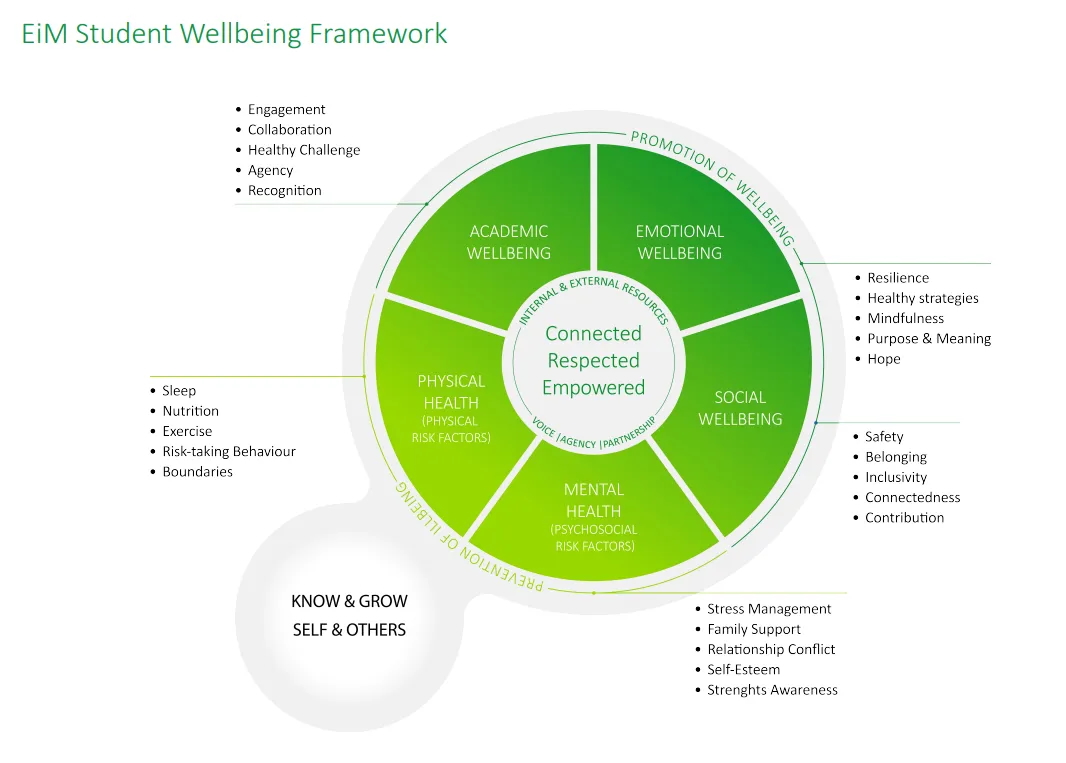Wellbeing
Wellbeing is a whole group culture which ensures that every member of the community can flourish. In supporting our students to enhance their wellbeing, our ultimate goal is that our students develop and are able to contribute positively to the wider community with meaning and purpose.

"At DCI schools, our students are our top priority. We’re dedicated to making sure our students feel safe, supported, and happy in our school communities. Their wellbeing, needs, and talents are at the heart of everything we do."
- Lesley Meyer, Chief Education Officer, Education in Motion (EiM)
To help our students lead fulfilling, successful, and purposeful lives—both in their studies and beyond—we have developed the Student Wellbeing Framework to guide how wellbeing is supported in ways that address the unique needs of every student, in every school.
The Student Wellbeing Framework
The Student Wellbeing Framework is a comprehensive model for student wellbeing which is designed to provide a foundation for the wellbeing strategy and implementation across our family of schools.

"Everyone in the DCI group is 100% committed to prioritising student wellbeing in each of our schools. Every school and every student is different, so we made sure that our new framework was descriptive, but not prescriptive. It was designed to give us a framework to talk about, audit and prioritise wellbeing for students, while allowing each school to tailor their approach to wellbeing according to the unique needs of their students and their community."
- Sarah Tielman, Student Wellbeing Framework Lead, Head of Dulwich International High School Programme Suzhou
The framework, developed through a consultative process with staff and students across our family of schools, is grounded in four guiding principles that reflect our commitment to student wellbeing:
- There is nothing more important for DCI than the health and wellbeing of our students and the entire community.
- The responsibility for the wellbeing of each individual student is shared by the community and the fostering of student wellbeing should be prioritised equally – inside and outside the classroom.
- Leadership and staff recognise that there is valuable, actionable wisdom uniquely inherent in the perspective, sentiment, and voice of students.
- Our health and wellbeing approach is designed to directly address the causes of student illbeing, by acknowledging risks like stress, self-esteem, and relationship conflict.

Engaging with Our Students
We view student engagement as a continuum of possibility and appropriateness. The overarching intent is for students to be engaged in dialogue at some level in all elements of schooling that affect their wellbeing.
Student Voice, Student Agency, and Student Partnership make up the three forms of student engagement. In our schools, we see exciting initiatives that engage students across the spectrum, from surveys offering students a 'voice' to express their feedback on their learning experiences, to students leading peer-to-peer mental health support in 'partnership' with school staff.
Partnering with Our Parents
By providing students and families with integrated and holistic support systems that focus on all areas of individual development, ability and interests, underpinned by the Student Wellbeing Framework, our students are provided with a supportive environment in which to learn and grow.
The home-school partnership is essential when we are considering our students wellbeing. Each school will already have many initiatives in place to educate and support parents throughout their child's education journey. Parents are encouraged to reach out to their child’s teacher when they have concerns or questions, to be engaged and interested in their child’s learning and to attend school events. A close connection between home and school will offer the best chance of promoting positive wellbeing for your child and enhancing the work that schools have begun around the Student Wellbeing Framework.




